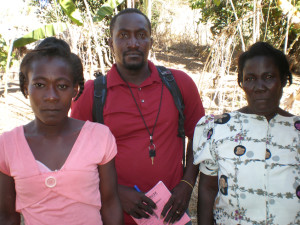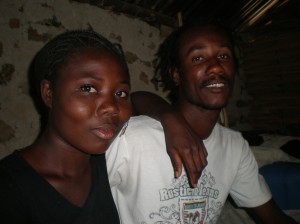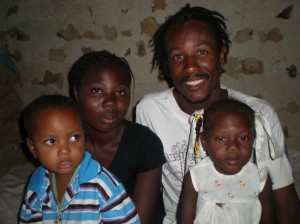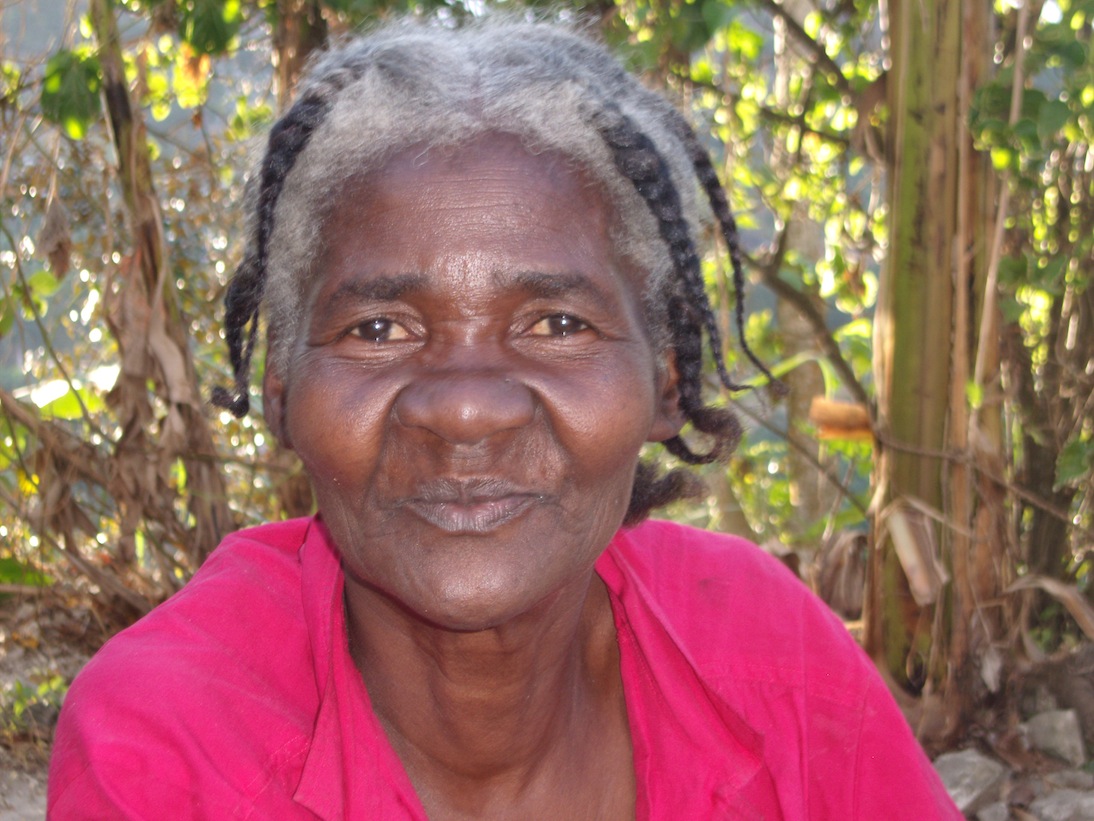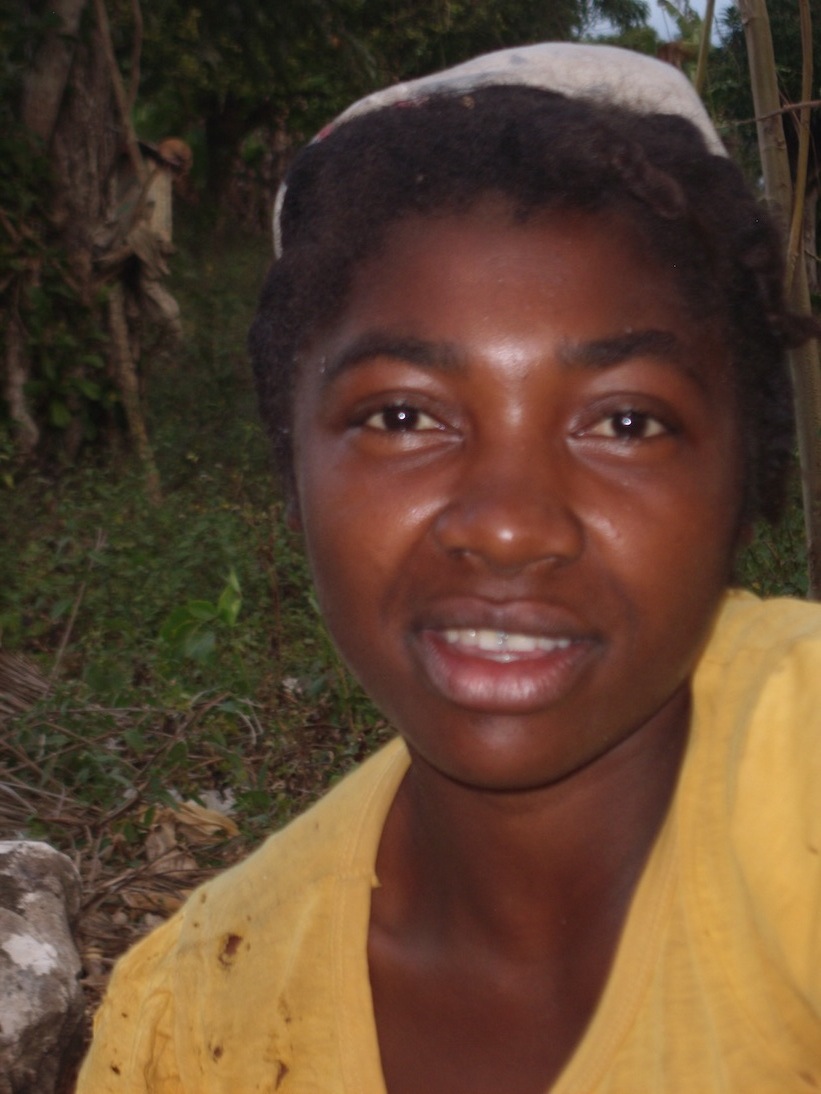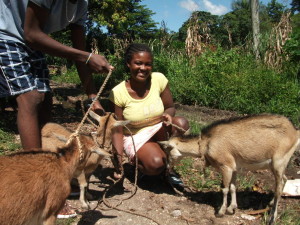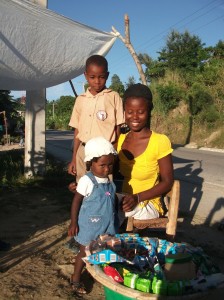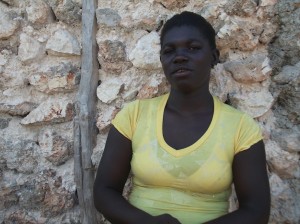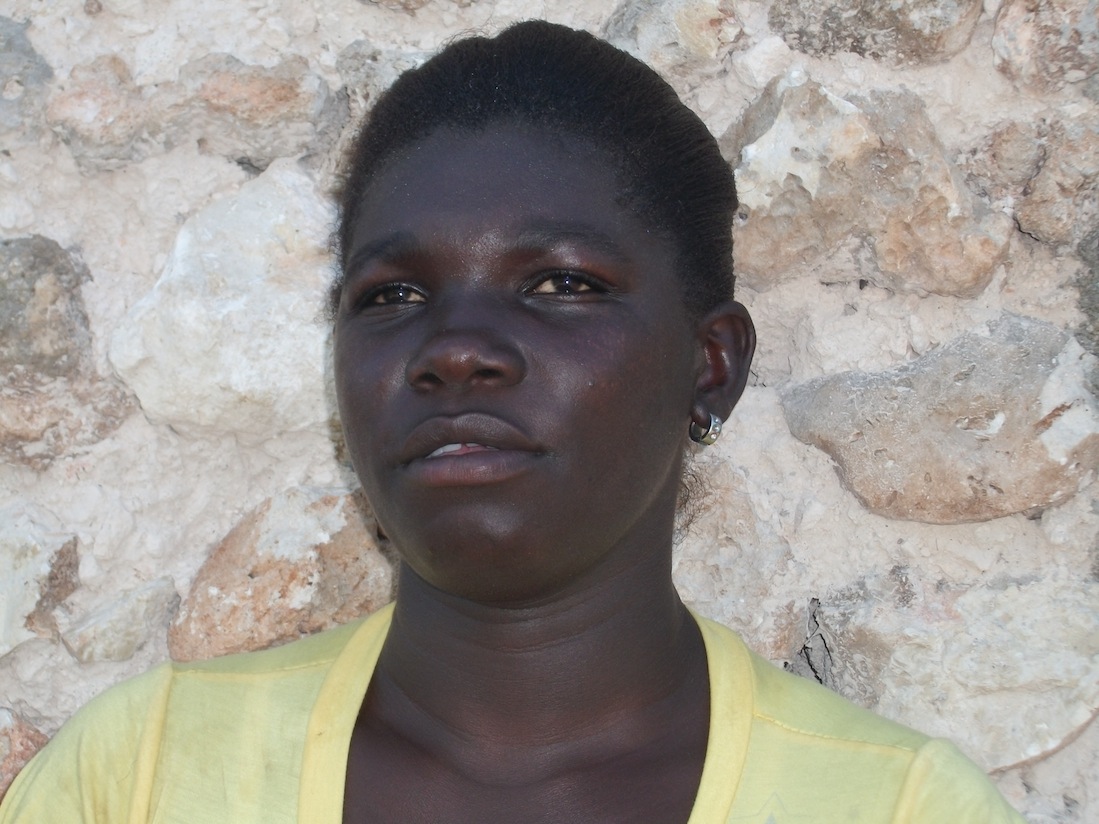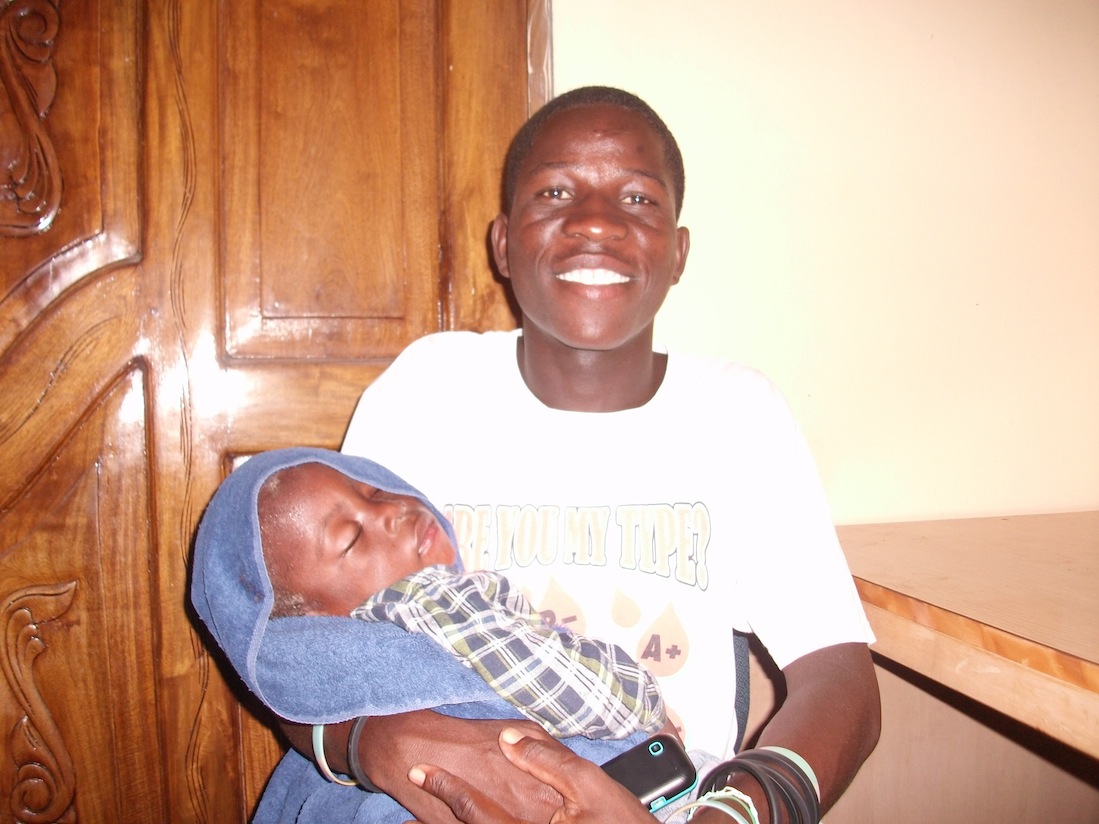March 5, 2014
Recently, I was back in court again with Safine. It turns out that her first trip to Judge Patrick’s courtroom did not solve her problems with Maxo, the father of her two youngest children. This time, she was the one filing the complaint. Maxo attacked her, hurting her badly enough that she had to go to the hospital. Normally, her case manager, Hilaire, would have accompanied her through this process, but he had been called away first thing in the morning to help another CLM member, so he asked me to fill in for him.
The woman he needed to help lives in the farthest pocket of Mazonbi, a secluded area in the southwest corner of our territory. Her name is Mimose, and her home is remote even within Mazonbi. Invisible from the narrow footpath that runs about 100 feet above it, you have to know where to step into a field of pigeon peas to find the trace of a path that winds downward through a series of jagged boulders to the small yard.
Mimose had borrowed a telephone the night before to call Hilaire. She was terribly distressed. A neighbor name Marc had killed two of her goats – large, healthy, pregnant ones – when they wandered into his unplanted garden. It was a huge setback.
So Hilaire got on his motorcycle early on a Thursday morning, and went off to see what he could do. When he got to Mazonbi, he found the beheaded goats hanging from a tree at the edge of Marc’s field. He tried talking to Marc about it, but Marc wouldn’t give him the time of day.
So he went to Dumisso. He is the secretary of the Village Assistance Committee for Mazonbi and Laferyè, a neighborhood along a ridge just east of the ridge the Mazonbi sits on. Dumisso told Hilaire that they really needed to do something. He had heard that community members in Mazonbi who had not been selected for CLM were jealous of the CLM members’ progress, and were saying that they would kill any of the goats they got their hands on. Dumisso felt that if we did not take a stand, our members’ losses would start piling up.
Hilaire went from Dumisso to the KASEK. A KASEK is a local elected official. In rural areas, they employ assistants, who are paid a couple of dollars to deliver messages, bring people the KASEK wants to see to him or her, or perform other minor duties. In this case, the KASEK sent his assistant to the man to let Marc know he wanted to see him. Marc responded that the KASEK should mind his own business.
Hilaire then took the assistant to see where the goats’ carcasses were hanging in the tree, and put him and Mimose on the back of his motorcycle so that Mimose could file a complaint in Judge Patrick’s court.
This is where things first got complicated. Our motorcycles are designed to take a passenger, but they are not designed for two. Hilaire is a very strong man, and he has a lot of experience with a motorcycle on bad roads, so he took a chance. He managed to get them up the terrible rocky road that leads out of Mazonbi and down to the highway in Fon Cheval. Going down from Fon Cheval to the courthouse in Trianon should have been much easier. But Hilaire hit a small patch of loose gravel on a sharp curve in the road, and because of all the extra weight behind him, the wheel slid out from under him. He and Mimose were both scraped up in the fall. Nothing too serious, but their wounds needed some attention. He got them to a small clinic just downhill from the courthouse.
By the time they got to the courthouse, we were finishing up Safine’s case against Maxo. Judge Patrick was instructing us all to go to the higher court in Mirebalais the next day. Since blood had been drawn, he said, the case went beyond his authority as justice of the peace. He would prepare a document for the higher judge in Mirebalais, and have us take it down the next day.
When Hilaire and Mimose arrived, Judge Patrick listened to them and agreed to go up to Mazonbi with his security guard and have a look. Hilaire was very sore, but he immediately agreed to lead them there. He asked me to switch motorcycles with him. His clutch had been damaged, and it would have been hard for him to negotiate the Mazonbi road whereas I would just have to coast downhill. So he took my bike, and they went back up the hill.
That evening, I heard from him that things had gone poorly. Marc and his friends had intimidated the judge and his security guard. They had been forced to leave the scene rather than risk a conflict. When Judge Patrick formally invited Marc to a hearing, Marc refused. So Judge Patrick, Hilaire, and the security guard returned to Trianon.
Hilaire was furious. He couldn’t understand why a representative of the government would let himself be chased away by threats. But there wasn’t much he could do. Judge Patrick filled out a warrant for Marc’s arrest, and gave it to Hilaire to bring to the police station down in Mirebalais.
Hilaire took the warrant to the station the next morning while I continued to follow-up with Safine. When we talked midday, he told me that the police had said that they didn’t right then have anyone available whom they could send after the guy.
In the meantime, Marc must have had second thoughts, because when the KASEK sent for him again, he had disappeared. An older relative of his – actually his wife’s cousin – sent word that she wanted to resolve things. She would give Mimose two of her goats if Mimose would let the matter drop.
So Hilaire and I went to Mazonbi with the KASEK, whose name is Lenèl, and Dumisso. Madanm Tibèt was the cousin trying to resolve things. Mimose came with her husband and Madanm Tibèt’s two goats, which her husband, Ozlèn, had already been watching for the older woman.
Madanm Tibèt explained that she couldn’t see why everyone was pursuing Marc. He is a poor man who had killed the goats because they threatened his farmland, which is his livelihood. We explained – with Lenèl’s help – that there are ways to go about things. Haiti’s rural legal code, which dates from the Duvalier years, does allow farmers to kill goats they find eating their crops. But the farmer is supposed to find a local authority to serve as a witness when he or she does so. The thought – I suppose – is that a witness can help a farmer cool down enough to accept monetary damages rather than the life of the goat, which is generally worth much more than the crops that it eats. Marc didn’t bother seeking a witness. He just killed the goats, singling out CLM goats in particular among several goats that were in his garden, and strung them up.
Madanm Tibèt wanted the matter settled because, first, she values peace and her neighborhood and, more importantly, she is a single mother who counts on Marc to farm her land for her. His arrest would be a direct threat to her livelihood.
But there was a problem. Mimose and Ozlèn didn’t want to accept her offer. They gave two reasons. On one hand, the goats Madanm Tibèt was offering were much less valuable than the goats Marc had killed. Their two, large, pregnant goats could have sold for over $70 each. The small mother that Madanm Tibèt wanted to give them with its kid couldn’t have sold for that much combined. On the other hand, Mimose and Ozlèn feel that they’ve had a good relationship with their wealthier neighbor. The fact that she has let Ozlèn care for her goats is good evidence of that. They are worried that her sacrifice will leave a bitter taste in her mouth, that she might come to hold it against them.
Eventually, however, they agreed. Partly, it was because they too wanted the matter settled. Partly, they were convinced when Madanm Tibèt reminded them that she had already lost a goat in their hands. She had left another female for Ozlèn to care for, and it had disappeared. She asked them whether she had ever bothered them about the lost goat, and they had to agree that she hadn’t.
So Lenèl drew up a formal agreement in which Mimose accepted three of Madanm Tibèt’s goats – the two that had been brought to the hearing and the one Ozlèn had lost – in exchange for her two. It was still a loss for her, but it was the best we thought she’d be able to do under the circumstances. So Hilaire encouraged her to sign. Lenèl pleased her by complimenting her for the way she signed her name to the agreement. It’s something she’s learned from Hilaire.
The hearing, held under a tree by the side of the road at the entrance to Mazonbi, took over two hours. It involved a lot of conversation. Much of it was related to the complexity of the problem involved. Some of it related to Dumisso’s desire to make the KASEK, who lives in a distant part of the region, recognize that he wasn’t spending enough time in their neck of the woods. He felt that Lenèl’s inattention was partly responsible for Mimose’s loss, and he said so clearly and at length.
I visited Mimose and Ozlèn a few days later, and they seemed at ease about by the way things had turned out. They were miserably poor when we first found them, but because they work hard and together, they’ve already come a very long way. As such, they present a stunning contrast to Safine, who has to waste a lot of time just working out her final separation from Maxo, a man who doesn’t do the simplest things she would need a partner to do. If this turns out to be their biggest setback, the Mimose and Ozlèn are very likely to be just fine.
